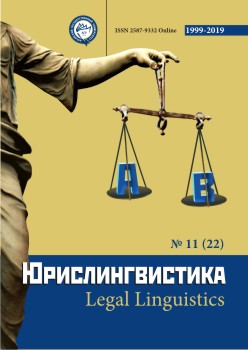LINGUISTIC EXPERTISE IN GERMANY
Abstract
The article deals with linguistic expertise in the legal system of Germany. Despite the fact that this field of linguistic activity has existed in the judicial practice of Germany for a long time, the role of linguistic experts in Germany is limited to only some traditional areas. This situation is primarily due to the special court principles and the highly structured sources of legal information that judges use for making decisions. In many cases this enables them to analyse and evaluate linguistic issues without any help of a linguist. Furthermore, economic factors play an important role in laying out the scope of activity of linguistic experts. This concerns in particular expert licenses and expert fees. The article provides examples from two legal comments to Section 185 of the German Criminal Code (insult), which are tipical sources on which the court may rely when making decisions.
Downloads
References
Ammer, M., Busch, B., Dorn, N., Rienzner, M., Santner-Wolfartsberger, A., Schicho, W., Seidlhofer, B., Spitzl, K. (2013). Ein umstrittenes Beweismittel: Sprachanalyse als Instrument der Herkunftsbestimmung im Asylverfahren. Juridikum, 3 (in German).
Damm, R., Rehbock, K. (2008). Widerruf, Unterlassung und Schadensersatz in den Medien. München (in German)
Dern, Ch. (2009). Autorenerkennung: Theorie und Praxis der linguistischen Tatschreibenanalyse. Stuttgart (in German)
Fobbe, E. (2017). Forensische Linguistik. In: Felder, Ekkehard; Vogel, F. (Ed.). Handbuch Sprache im Recht. Berlin (in German)
Grewendorf, G. (1992). Rechtskultur als Sprachkultur. Der sprachanalytische Sachverstand im Recht. Rechtskultur als Sprachkultur. Zur forensischen Funktion der Sprachanalyse. Frankfurt a. M. (in German)
Heintschel-Heinegg, von B. (2018). Strafgesetzbuch. 37 Edition, München (in German)
Kniffka, H. (1981). Der Linguist als Gutachter bei Gericht. In: Peuser, G., Winter, S. (Eds.). Angewandte Sprachwissenschaft: Grundfragen, Berichte, Methoden. Festschrift für Günter Kandler. Bonn (in German)
Kniffka, H. (1990a). Einleitung: Forensische Linguistik. In: Kniffka, H. (Ed.). Texte zu Theorie und Praxis forensischer Linguistik. Tübingen (in German)
Kniffka, H. (1990b). Alles ist Tatfrage des Einzelfalls – Oder: Herr X. bzw. seine Konkubine. In: Kniffka, H. (Ed.). Texte zu Theorie und Praxis forensischer Linguistik. Tübingen (in German)
MüKo StGB. (2017). Münchener Kommentar zum Strafgesetzbuch. München: C.H. Beck (in German)
Parádi, Zs. (2005). Zum Verwechseln unähnlich. Ein sprachwissenschaftlicher Beitrag zur Argumentation in Markenrechtsurteilen. In: Lerch, K. D. (Ed.). Recht verhandeln. Argumentieren, Begründen und Entscheiden im Diskurs des Rechts. Berlin, New York (in German)
Ritter, Ch. (1990). Sprachexpertisen im Zivilprozess. In: Kniffka, H. (Ed.). Texte zu Theorie und Praxis forensischer Linguistik. Tübingen (in German)
Sommer, Ulr. (2002). Lebenserfahrung – Gedanken über ein Kriterium richterlicher Beweiswürdigung. In: Hanack, E.-W. et al. (Ed.). Festschrift für Peter Riess zum 70. Geburtstag am 4. Juni 2002. Berlin, New York (in German)
Steinke, W. (1994). Der Beweiswert forensischer Gutachten. NStZ (in German)
Stetter, Ch. (1990). Zum juristischen Gebrauch linguistischer Kategorien. In: Kniffka, H. (Ed.). Texte zu Theorie und Praxis forensischer Linguistik. Tübingen (in German)
Wirth, I. (2013). Kriminalistik-Lexikon. München (in German)
IHK Frankfurt. (2012). IHK Frankfurt. Sachverständigenordnung. Vorschriften der Industrie- und Handelskammer Frankfurt am Main über die öffentliche Bestellung und Vereidigung von Sachverständigen vom 27.06.2012, gemäß §36 Gewerbeordnung. Available from:
https://www.frankfurt-main.ihk.de/imperia/md/content/pdf/recht/sachverst__ndigenordnung.pdf/ (in German)
IfS. (2017). Institut für Sachverständigenwesen e. V. Empfehlungen zur Erstellung eines Gutachtens vom 4/2017. Available from: https://www.ifsforum.de/fileadmin/user_upload/Merkblatt_Gutachtenaufbau2017.pdf (in German).
Copyright (c) 2019 Мария Мущинина

This work is licensed under a Creative Commons Attribution 4.0 International License.
The authors, which are published in this journal, agree to the following conditions:
1. Authors retain the copyright to the work and transfer to the journal the right of the first publication along with the work, at the same time licensing it under the terms of the Creative Commons Attribution License, which allows others to distribute this work with the obligatory indication of the authorship of this work and a link to the original publication in this journal .
2. The authors retain the right to enter into separate, additional contractual agreements for the non-exclusive distribution of the version of the work published by this journal (for example, to place it in the university depository or to publish it in a book), with reference to the original publication in this journal.
3. Authors are allowed to post their work on the Internet (for example, in a university repository or on their personal website) before and during the review process of this journal, as this may lead to a productive discussion, as well as more links to this published work (See The Effect of Open Access).










